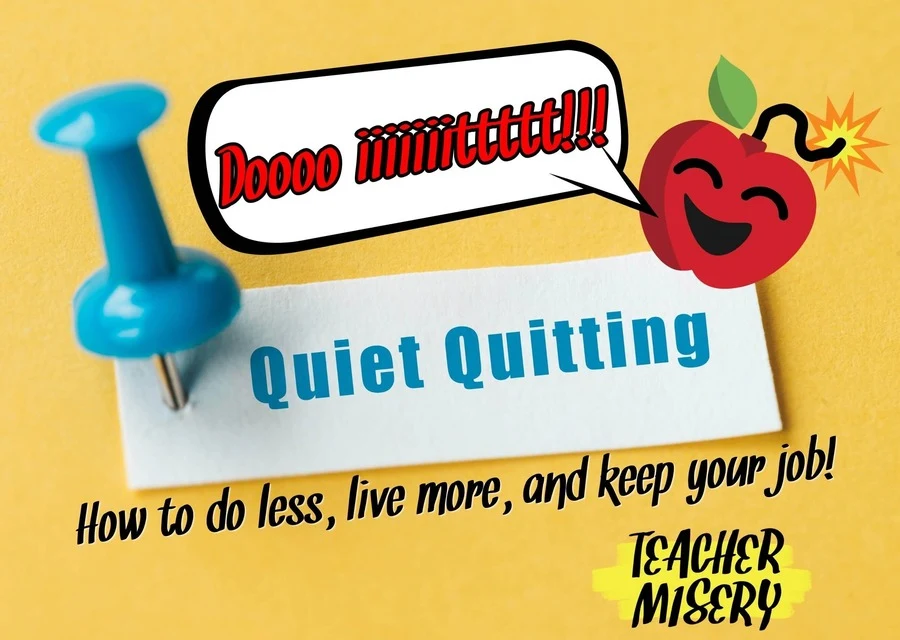I am, and have almost always been, a shameless quiet quitter. Truthfully, quiet quitting teaching was one of the only ways I managed to stay sane in the profession for 15+ years!
So many teachers are suffocating under the crushing weight of their disproportionate work-life balance. It’s one boulder up a hill after another while the goalposts of their “scope of duties” become increasingly broadened and further mystified.
This post is about how YOU can save yourself from the teaching profession and regain control over your own hours. All the while, you never actually need to leave the teaching profession. You can keep making a positive contribution while getting paid for not sacrificing your well-being.
And the secret weapon to this happier home life? Quiet quitting. I.e., doing your exact job duties and contract hours and NO MORE.
So from one shameless and proud quit quitter to one wannabe cruiser, take my hand. Let me show you an easier and more stress-free way to teach.
This is exactly how to quietly quit teaching and feel better for it.

What Does Quiet Quitting Mean?
(And How Does That Play Out in Schools?)
Firstly, before even touching on teaching, what is quiet quitting? Let’s define the terminology.
Quiet quitting is a fairly new, trendy concept that has been thrown around social media and the press a lot lately. However, the idea really isn’t all that revolutionary. And also, it doesn’t involve quitting at all.
Various sources will tell you that all the term quiet quitting means is doing exactly what is in your job description and nothing more. No putting in extra hours or effort; no going above and beyond. Just the bare minimum job duties that are expected of you.
Quitting quietly also looks like setting boundaries, as much as with yourself as with others. If you work a 9 to 5, then those are your work hours. You…
- Clock in at 9 and clock off at 5.
- You don’t check emails outside of these hours.
- You aren’t contactable for work things outside of work.
- You say no to increased or extra duties without compensation.
- Etcetera etcetera.
Basically, if it looks like putting in extra hours or more effort than what is required by your contract, you don’t do it. If someone asks you to photocopy something at 4:57 PM, it gets done the next day.

But as magical as the quiet quitter mentality is, it’s not a seamless fit for teaching.
When it comes to trying to quiet quitting a teaching job, the problem is that there is no real job description. We are given expectations and responsibilities which are constantly piling up. When looking at a bunch of basic teacher evaluation forms, they all boil down to similar expectations:
- Preparedness and planning
- Knowledge of the subject
- Use of a variety of tools and strategies
- Professionalism
- Utilize appropriate and timely feedback
And the more the scope of these expectations expands, equally so does the stress of teaching!
So let’s break each of these expectations down! What is really expected? What is actually necessary? How can you regain your life balance???
Here are my pearls and nuggets of wisdom on the matter of quiet quitting.
Get the Books That Started It All
Before the blog, the podcast, the merch store… there were the best-selling books.
If you like the content on this site, then you’ll LOVE the Teacher Misery books. They’re jam-packed with teaching insanity, ridiculous true stories, and all the commiseration about the profession you’ve come to know, adore, and respect.
Follow the links below to get your copies today!

Quiet Quitting Teaching: A Step By Step Guide
Ok! So the what is clear, and the why is pretty clear too. Quiet quitting is NOT quitting. It’s a way to actually maintain your teaching job without letting it dominate and disrupt your life.
The philosophy might be your ace in the hole. Maybe it will save you from (another) nervous breakdown. Maybe it will save you from quitting teaching entirely mid-year!
Either way, being a teacher means having a bit more dexterity and grace when quietly quitting. So from my 15+ years of experience mastering the bare minimum lifestyle, here’s exactly how to quietly quit teaching.
1. Expectation #1: Preparedness and Planning
What generally falls under this category is lesson planning and having lessons ready to go beforehand, along with crucial teaching supplies and materials such as worksheets and markers. Obviously, this IS a minimum requirement of teaching. But just how much do you really need to plan?
If you’ve taught the course before, you can probably figure out what you need ahead of time. Your personality type will also dictate exactly how much time you will prepare beforehand – putting in more preparation is perfectly okay if that’s your preferred style.
For me personally, having two days planned with items ready to go has always been good enough. I’ve taught at schools that want some kind of “lesson plan” for the following week, so I would put a bunch of stuff on there and then maybe do that stuff, maybe not. No one ever looked, checked, or cared. (Even the school administrators are quiet quitting!)

Have to turn in a year’s worth of lesson plans? (Eww, what kind of monsters are you even working for?) Then ask other teachers to share entire units with you and throw those together to turn in. I can almost guarantee that no one will be comparing to see if you follow through with all that lesson planning.
Don’t have anyone who will share more content with you? Google it, baby! And don’t go spending money on Teachers Pay Teachers either. There is plenty of free stuff out there that will suffice.
Either way, the method is in the madness. Good execution is one part planning and nine parts looking like you planned everything else. Plan out what YOU feel meets your personal workflow, and then cut corners for the rest.
More than a week’s worth of lesson plans is overkill anyway.
Plan Simply for Emergencies
Another key tidbit of advice on how to quietly quit as a teacher is to plan for day-of teaching emergencies.
I recommend printing out a ton of worksheets to have on hand for emergencies if something you planned doesn’t take up enough time. Or you have a headache and don’t feel like doing that teacher-led assignment you were planning to do!

Other than that, the key to saving yourself stress is to let the perfectionism go. Stop trying to make everything perfect, amazing, super-duper engaging, beautiful, etc. We call that “diminishing returns”, and it’s a mistake you make on your first day as a new teacher and then never again
I can definitely fall into that trap when I start making something in Canva (dog GIFs, anyone?)… But the truth is that the students might appreciate it for all of two seconds, and then they’ll move on with their lives and get back on their phones. Plus, that mind-blowing, technologically advanced thing you made will be totally lame in two years.
When in doubt, K.I.S.S.: Keep It Simple, Stupid. Do something simple, save yourself three hours of work, and move on.
2. Expectation #2: Knowledge of the Subject
Do we even need to discuss this…?
Obviously, if you can’t do AP Calculus, then you shouldn’t sign up to teach it! I truly think this category exists to get rid of the occasional weirdo who gets hired to teach something and then doesn’t know what they’re talking about and just tells random stories and/or shows movies.

There’s no real way to quiet quit your curriculum subject knowledge. My advice would be more to stay in your wheelhouse!
I taught English subjects for a long time. It didn’t take long before that course-specific experience and knowledge only aided my preparation, my shortcut taking, and my ability to quiet quit in my classes.
So, basically, stay in your lane! Don’t go hopscotching into teaching classes you’re not proficient in. And if any superiors ask you to, keep setting boundaries and just tell them “no”. Otherwise, you’ll be right back to square one for preparation and planning.
It might sound stale, but that’s teaching. Choose a different career if you want fewer terrible professional development opportunities!
3. Expectation #3: Variety of Tools and Strategies
What this really means is that you can’t be a complete and total bore and put in zero effort. You can’t just lecture/babble for the entire period, or show a movie every day. Those things leave the realms of quietly quitting teaching into straight slacking territory.
However… loophole alert! You CAN do those things in moderation, albeit mixed with group work, creative projects, and class discussions.
Believe it or not, this doesn’t require a lot of prep. I’m sure you’ve heard the term “don’t reinvent the wheel” a million times, and there’s a reason this is said to teachers so often.

Sure, you could spend hours making an incredibly interactive and engaging slideshow with the latest widgets and hella fresh dank memes. But I can guarantee that someone else made something similar that you can easily find online. Besides, those widgets (and memes) won’t be so innovative in another year or two, and then you’ll have to remake the darn thing.
We’re not trying to win Teacher of the Year here. We’re just finding the best way to survive the teaching profession.
Before you consider making anything yourself, scour the internet. Teachers Pay Teachers offers plenty of free materials alongside paid ones, and there are countless teacher blogs that share materials too.
You can also search your school or district’s shared drive for materials if no one on your team feels like sharing. But whatever you do, change it up and keep finding new materials so they can’t say you’re boring. And sneak a movie into the class rotation from time to time!
The kids will thank you for it.
4. Expectation #4: Professionalism
This is probably the most important standard to pay attention to if you’re gonna take shortcuts on most of the other stuff. But it’s not as fancy as it sounds. “Professionalism” boils down to showing up on time, looking like a functional human being, and not being an all-around giant pain in the butt.
There are a lot of awful teachers in the world. So don’t be one!
In the modern world of teaching, the bare minimum cuts it. Administrators need adult bodies in the classroom more than anything else. They appreciate anyone who can fill that role without adding to the stress of trying to find a willing person to babysit a classroom of other people’s kids (because they sure ain’t gonna do it!).
If you always show up on time, are rarely absent, and always fulfill the contracted hours and job duties that are asked of you, they are much less likely to start looking at what you’re doing with a microscope. At the very least, don’t show up late wearing Spongebob crocs and ripped jeans to teach your class about the benefits of communism! Look good, be punctual, and don’t rock the boat (i.e., stay apolitical).

And on that note, keep your mouth shut during meetings! Even when they ask for your opinion, I can guarantee that they do not actually want it.
Though I’m a big-mouthed complainer and commiserater of all things everywhere, I highly recommend just keeping your trap shut if you actually want to stay at that school. Don’t let them fool you. They really don’t want you to ask questions and they definitely don’t want your input.
Just look the part. School administrators just want drones – not free thinkers. There’s some irony in that.
Buy Some Merch · Support the Site!
Teacher Misery is by the teachers and for the teachers. Our mission to improve the lives of teachers everywhere.
If you’d like to support the cause, buy yourself (or the burnt-out educator in your life) a gift from our merch store. And, YES, they are all as sarcastic as you’d hope. 😉
Every dollar supports the commiseration!

5. Expectation #5: Assessment and Feedback
This is where the main issue of time, a lack thereof, and a waning work-life balance happens for most teachers.
When will you grade all of the work the students complete throughout the day? Should you take home a stack of essays to grade every weekend? Or only do what you can when you’re at school?
And most importantly, does any of that affect affect your salary?
Well, look, let’s clear the elephant from the room first. Don’t fool yourself into thinking that you have to do all the grading and give all that feedback to be an effective teacher. It’s neither one of the qualities that make a great teacher nor the best way to teach overall.
I have noticed over many years that almost all students completely disregard the comments and edits I’ve made on their work. They generally go right to the grade, decide if it matches the level of effort they put in, and then throw it in the recycling bin. The only time they will ask you about it is if it seems wildly low, which segues me to my favorite grading device…

Use a rubric!
In my opinion, if you design and use a detailed rubric to grade work and assignments, it takes care of the need to give tons of feedback. It also serves as justification for the grade you gave. You don’t need additional comments if every possibility is included on the rubric. And you definitely don’t need to edit the crap out of the assignments either because they aren’t going to do anything with those edits.
For a while, with older high school students, I told them that if they wanted my edits and extensive feedback, they needed to print their paper and hand it to me the day it was due. Otherwise, they can just turn it in online. Almost every time, only about 5 students turned in printed papers out of 100.

I still give them a detailed rubric, so why waste time if they don’t want it? Give the students choice. They’ll be happier for it, and you’re unlikely to need to do nearly as much work as a result.
Take Grading Shortcuts
Another strategy to use to cut down on the after-hours unpaid labor is to just check basic things like homework with a glance in class. You don’t need to collect and read everything. (But every once in a while just lean over and actually read some of it to make sure it isn’t total nonsense.)
Also, save yourself some time: don’t grade everything that is turned in. Remember, you aren’t required to grade everything they do!
Anytime I know I don’t want to grade work, I just give it out on paper. That way I can collect it, shove it in a drawer, and we all forget about it. But if you tell them it won’t be graded, then they won’t put in any effort, so keep that a secret. ;)

Ready to Quietly Quit Teaching?
Honestly, the term quiet quitting is a misnomer to begin with. There is no quitting to be had. Performing just your contracted hours and scope of job duties without going above and beyond should be the baseline in ANY job.
Any workplace that expects more than that without appropriate remuneration is a toxic one. And the level to which teachers are exploited and taken advantage of in the workplace is nothing short of farcical.
So set ‘dem boundaries and regain your work-life balance! Even if it means being a bit cheeky and gaming the system to do it. But the most important part of doing a whole lot less right down to the bare minimum as a teacher is to ensure that the students like you.

That doesn’t mean you have to bribe them with candy, go too easy on them, or be their best friend. It means you have to be fair, reasonable, compassionate, flexible, and understanding (even with all ridiculous excuses for being absent and whatnot).
And grade work on the easier side too! If you are going to be a stickler for discipline, grading, and/or late policies, the students will do nothing but complain about you and do things like giving you worse feedback. And then some administrator is going to be following up with you, which is the last thing you want when quiet quitting teaching!
Will some students take advantage of your kindness? Yup!
Would some of them benefit from a teacher who goes much harder and has very high expectations? Maybe. But that also depends on their home life, their parents, and a myriad of other variables outside of a teacher’s control.
But ultimately, the data doesn’t lie, and the data is saying we’re facing a crippling teacher shortage! And that quiet quitting is becoming the cross-industry norm. Most teachers have or are leaving the profession, and only those who find a way to rethink and rework the job will be able to stay.
I can guarantee it.
And What if Quiet Quitting Isn’t Enough?
Then, honestly, quit! A whole life waits beyond teaching. there’s no shame in staying and trying to make it work for you, but there’s also no shame in moving on for greener pastures.
If you want to look at a life beyond teaching, there are heaps of other jobs you can do. And even services to help you quit.
The Teacher Career Coach Course is one such service, and what a service it is!
Founded by a professional EX-teacher who’s developed a whole career around helping other ex-teachers, The Teacher Career Coach Course will help you move on AND on to something better. They provide downloadable materials, resume and job hunt assistance, community support, various other resources… They’re your first step to a life beyond teaching!
But whatever you do, have no fear. There are plenty of other jobs for former teachers. And if you choose to stay and quit teaching quietly instead, that works just as well!
But whatever you do, hold firm. You only get one life, so don’t waste it on a job. And remember that when it comes to your work-life, the only commitments you have are the ones you’re contractually obligated to fulfill.
Everything else is not your monkeys, not your circus, and they most certainly ain’t your clowns.




PJ
Thursday 26th of December 2024
I agree with Michael’s comment. I don’t know how to quiet quit on the student nastiness, apathy, and disrespect. I wish I could just think of it as babysitting, which it is now, but I see their grim futures and it makes my stomach hurt. I’m really glad I found this website and Jane Morris. It’s given me much to think about on how to make it to May, and what to do after that. 19 years as a teacher and I’d get out today if I could without getting punished (license suspension and steep fine).
Michael
Saturday 5th of October 2024
Great suggestions. I wish there were a way to quiet quit the constant barrage of student disruptions and disrespect as well as parent entitlement and unrealistic expectations.
Kathy
Tuesday 31st of January 2023
Amen. I’ve been quiet quitting all year. Just overly fed up with the constant bs. One teacher got her trash chewed out by the district ‘instruction’ expert because she didn’t take papers home to grade on her own time, that’s when I knew I was done bending over backwards and neglecting my own family and myself for a place that doesn’t value my time.